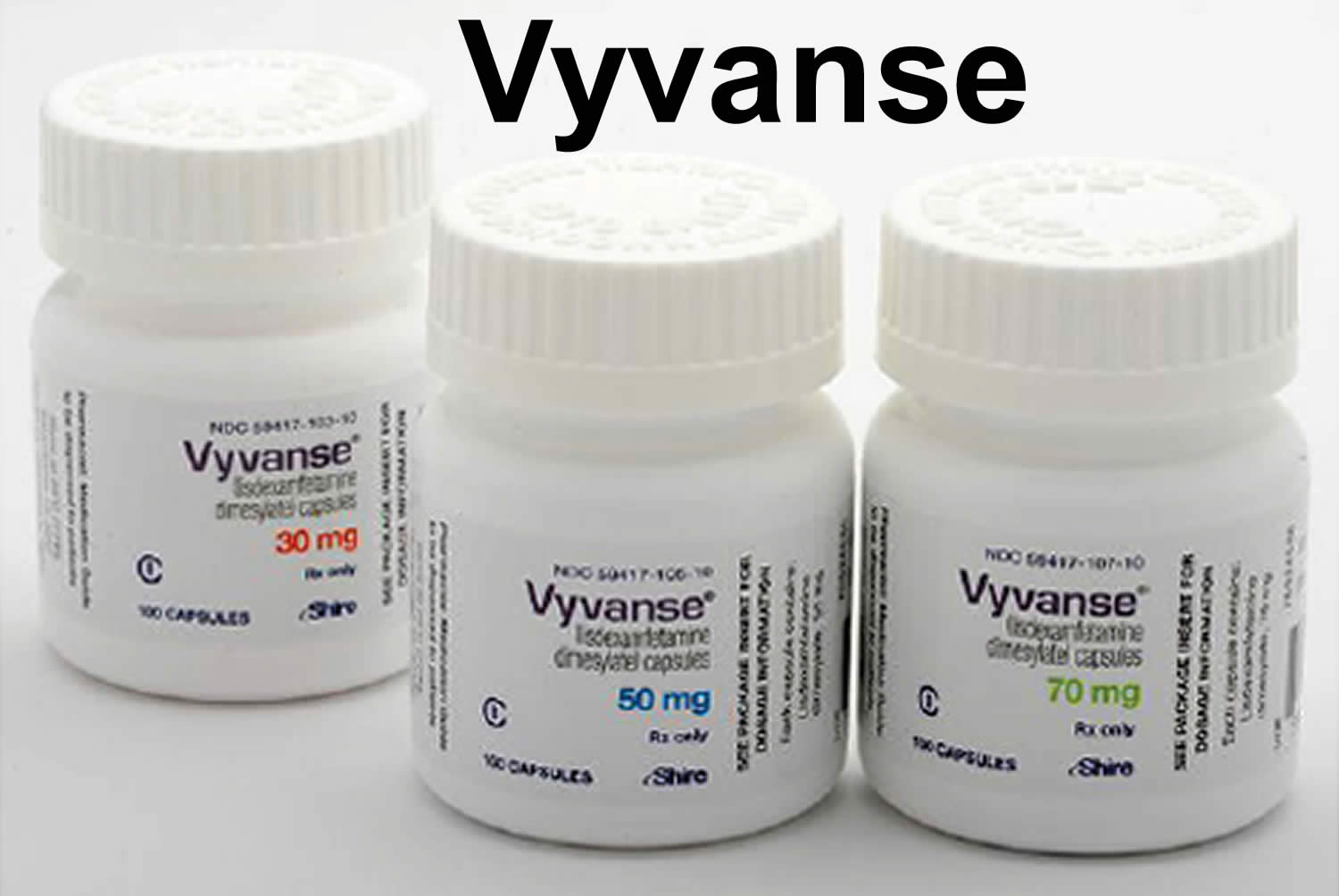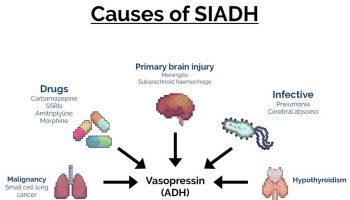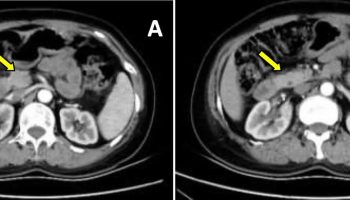What is vyvanse
Vyvanse (lisdexamfetamine) is used as part of a treatment program to control symptoms of attention deficit hyperactivity disorder (ADHD; more difficulty focusing, controlling actions, and remaining still or quiet than other people who are the same age) in adults and children. Vyvanse (lisdexamfetamine) is also used to treat binge eating disorder (an eating disorder characterized by periods of uncontrolled overeating). Do not use Vyvanse (lisdexamfetamine) for weight loss; use of sympathomimetic drugs for weight loss is associated with serious adverse cardiovascular events 1. Vyvanse (lisdexamfetamine) should not be used for weight loss in people who are obese or who are overweight. Efficacy and safety of lisdexamfetamine for treatment of obesity has not been established 1. Vyvanse (lisdexamfetamine) is in a class of medications called central nervous system stimulants. Vyvanse (lisdexamfetamine) works by changing the amounts of certain natural substances in the brain.
Vyvanse (lisdexamfetamine) can be habit-forming. Do not take a larger dose, take it more often, take it for a longer time, or take it in a different way than prescribed by your doctor. If you take too much Vyvanse (lisdexamfetamine), you may find that the medication no longer controls your symptoms, you may feel a need to take large amounts of the medication, and you may experience symptoms such as reddening of the skin, difficulty falling asleep or staying asleep, irritability, hyperactivity, and unusual changes in your personality or behavior. Overusing Vyvanse (lisdexamfetamine) may also cause sudden death or serious heart problems, such as heart attack or stroke.
Tell your doctor if you or anyone in your family drinks or has ever drunk large amounts of alcohol, uses or has ever used street drugs, or has overused prescription medications. Your doctor will probably not prescribe Vyvanse (lisdexamfetamine) for you.
Do not suddenly stop taking Vyvanse (lisdexamfetamine) without talking to your doctor, especially if you have overused the medication. Your doctor will probably decrease your dose gradually and monitor you carefully during this time. You may develop severe depression and extreme tiredness if you suddenly stop taking Vyvanse (lisdexamfetamine) after overusing it.
Do not sell, give away, or let anyone else take your medication. Selling or giving away Vyvanse (lisdexamfetamine) may harm others and is against the law. Store Vyvanse (lisdexamfetamine) in a safe place so that no one else can take it accidentally or on purpose. Keep track of how many capsules are left so you will know if any are missing.
Your doctor or pharmacist will give you the manufacturer’s patient information sheet (Medication Guide) when you begin treatment with Vyvanse (lisdexamfetamine) and each time you get more medication. Read the information carefully and ask your doctor or pharmacist if you have any questions. You can also visit the Food and Drug Administration (FDA) website (https://www.accessdata.fda.gov/scripts/cder/daf/index.cfm) or the manufacturer’s website to obtain the Medication Guide.
What does vyvanse do?
Vyvanse (lisdexamfetamine) is a dextroamphetamine drug precursor, a non-catecholamine sympathomimetic amine, that also functions as a central nervous system (CNS) stimulant and dopamine uptake inhibitor and is used in the treatment of attention deficit/hyperactivity disorder (ADHD). Upon administration, lisdexamphetamine is converted to dextroamphetamine through cleavage of the lysine group. Dextroamphetamine acts by facilitating the release of catecholamines, particularly noradrenaline and dopamine, from its storage sites in nerve terminals in the central nervous system (CNS), and inhibits their uptake within the mesocorticolimbic system, a major component of the brain reward system, resulting in measurable behavioral changes such as euphoria, mental alertness and excitement and appetite suppression. As a central nervous system (CNS) stimulant, Vyvanse (lisdexamfetamine) may increase blood pressure.
How long does vyvanse last?
Onset of Vyvanse (lisdexamfetamine) effects occur within 2 hours after oral administration 2.
Vyvanse (lisdexamfetamine) effects last approximately 10–12 hours 3.
How should vyvanse medication be used?
Vyvanse (lisdexamfetamine) comes as a capsule to be taken by mouth. Vyvanse is usually taken once a day in the morning with or without food. Take Vyvanse (lisdexamfetamine) at around the same time every day. Do not take Vyvanse (lisdexamfetamine) in the late afternoon or evening because it may cause difficulty falling asleep or staying asleep. Follow the directions on your prescription label carefully, and ask your doctor or pharmacist to explain any part you do not understand. Take Vyvanse (lisdexamfetamine) exactly as directed.
You may swallow the capsule whole, or you may open the capsule, sprinkle the entire contents into yogurt, a glass of water, or orange juice. Stir to dissolve and swallow the mixture right away. Do not store the mixture for future use, and do not divide the contents of one capsule into more than one dose.
Your doctor will probably start you on a low dose of Vyvanse (lisdexamfetamine) and increase your dose gradually, not more often than once every week.Your doctor may decrease your dose if you experience unpleasant side effects.
Your doctor may tell you to stop taking Vyvanse (lisdexamfetamine) from time to time to see if the medication is still needed. Follow these directions carefully.
Vyvanse special precautions
Before taking Vyvanse:
- tell your doctor and pharmacist if you are allergic to Vyvanse (lisdexamfetamine); other stimulant medications such as amphetamine (in Adderall), benzphetamine (Didrex), dextroamphetamine (in Adderall, Dexedrine, Dextrostat), methamphetamine (Desoxyn); any other medications, or any of the ingredients in Vyvanse (lisdexamfetamine) capsules. Ask your doctor or pharmacist or check the manufacturer’s information for a list of the ingredients.
- tell your doctor if you are taking a monoamine oxidase (MAO) inhibitor such as isocarboxazid (Marplan), phenelzine (Nardil), selegiline (Eldepryl, Emsam, Zelapar), and tranylcypromine (Parnate), or if you have stopped taking one of these medications during the past 2 weeks. Your doctor will probably tell you not to take Vyvanse (lisdexamfetamine) until at least 14 days have passed since you last took an MAO inhibitor.
- tell your doctor and pharmacist what other prescription and nonprescription medications, vitamins, nutritional supplements, and herbal products you are taking. Be sure to mention any of the following: acetazolamide (Diamox), ascorbic acid (Vitamin C), other medications for ADHD, sodium bicarbonate (Arm and Hammer Baking Soda, Soda Mint), and sodium phosphate (OsmoPrep, Visicol). Your doctor may need to change the doses of your medications or monitor you carefully for side effects. Many other medications may also interact with Vyvanse (lisdexamfetamine), so be sure to tell your doctor about all the medications you are taking, even those that do not appear on this list.
- tell your doctor if anyone in your family has or has ever had an irregular heartbeat or has died suddenly. Also tell your doctor if you have recently had a heart attack and if you have or have ever had a heart defect, high blood pressure, an irregular heartbeat, hardening of the arteries, or other heart problems. Your doctor will examine you to see if your heart and blood vessels are healthy before you start taking Vyvanse (lisdexamfetamine) and will check your heart and blood pressure regularly during your treatment with Vyvanse (lisdexamfetamine). Your doctor will probably tell you not to take Vyvanse (lisdexamfetamine) if you have a heart condition or if there is a high risk that you may develop a heart condition.
- tell your doctor if you or anyone in your family has or has ever had depression, bipolar disorder (mood that changes from depressed to abnormally excited), or mania (frenzied, abnormally excited mood), motor tics (repeated uncontrollable movements), verbal tics (repetition of sounds or words that is hard to control), or Tourette’s syndrome (a condition characterized by the need to perform repeated motions or to repeat sounds or words), or has thought about or attempted suicide Also tell your doctor if you have or have ever had Raynaud’s disease (problems with blood flow to the fingers, toes, ears, and nose), mental illness, seizures, an abnormal electroencephalogram (EEG; a test that measures electrical activity in the brain), glaucoma (increased pressure in the eye that may cause vision loss), hyperthyroidism (condition in which there is too much thyroid hormone in the body), or kidney disease.
- tell your doctor if you are pregnant, plan to become pregnant, or are breastfeeding. If you become pregnant while taking Vyvanse (lisdexamfetamine), call your doctor.
- talk to your doctor about the risks and benefits of taking Vyvanse (lisdexamfetamine) if you are 65 years of age or older. Older adults should not usually take Vyvanse (lisdexamfetamine) because it is not as safe as other medications that can be used to treat the same condition.
- you should know that Vyvanse medication may make it difficult for you to perform activities that require alertness or physical coordination. Do not drive a car or operate machinery until you know how Vyvanse medication affects you.
- you should know that Vyvanse (lisdexamfetamine) should be used as part of a total treatment program for ADHD, which may include counseling and special education. Make sure to follow all of your doctor’s and/or therapist’s instructions.
Vyvanse vs Adderall
Adderall contains a combination of amphetamine and dextroamphetamine. Amphetamine and dextroamphetamine are central nervous system stimulants that affect chemicals in the brain and nerves that contribute to hyperactivity and impulse control.
Adderall is used to treat narcolepsy and attention deficit hyperactivity disorder (ADHD).
The mode of therapeutic action in Attention Deficit Hyperactivity Disorder (ADHD) is not known. Amphetamines are thought to block the reuptake of norepinephrine and dopamine into the presynaptic neuron and increase the release of these monoamines into the extraneuronal space.
Amphetamine is reported to be oxidized at the 4 position of the benzene ring to form 4-hydroxyamphetamine, or on the side chain α or β carbons to form alpha-hydroxy-amphetamine or norephedrine, respectively. Norephedrine and 4-hydroxy-amphetamine are both active and each is subsequently oxidized to form 4-hydroxy-norephedrine. Alpha-hydroxy-amphetamine undergoes deamination to form phenylacetone, which ultimately forms benzoic acid and its glucuronide and the glycine conjugate hippuric acid. Although the enzymes involved in amphetamine metabolism have not been clearly defined, CYP2D6 is known to be involved with formation of 4-hydroxy-amphetamine. Since CYP2D6 is genetically polymorphic, population variations in amphetamine metabolism are a possibility.
Amphetamine is known to inhibit monoamine oxidase, whereas the ability of amphetamine and its metabolites to inhibit various P450 isozymes and other enzymes has not been adequately elucidated. In vitro experiments with human microsomes indicate minor inhibition of CYP2D6 by amphetamine and minor inhibition of CYP1A2, 2D6, and 3A4 by one or more metabolites. However, due to the probability of auto-inhibition and the lack of information on the concentration of these metabolites relative to in vivo concentrations, no predications regarding the potential for amphetamine or its metabolites to inhibit the metabolism of other drugs by CYP isozymes in vivo can be made.
Adderall contraindications
Advanced arteriosclerosis, symptomatic cardiovascular disease, moderate to severe hypertension, hyperthyroidism, known hypersensitivity or idiosyncrasy to the sympathomimetic amines, glaucoma.
Agitated states.
Patients with a history of drug abuse.
During or within 14 days following the administration of monoamine oxidase inhibitors (hypertensive crises may result).
Adderall important information
Adderall may be habit-forming, and this medicine is a drug of abuse. Tell your doctor if you have had problems with drug or alcohol abuse.
Stimulants have caused stroke, heart attack, and sudden death in people with high blood pressure, heart disease, or a heart defect.
Do not use this medicine if you have used a MAO inhibitor in the past 14 days, such as isocarboxazid, linezolid, methylene blue injection, phenelzine, rasagiline, selegiline, or tranylcypromine.
Adderall may cause new or worsening psychosis (unusual thoughts or behavior), especially if you have a history of depression, mental illness, or bipolar disorder.
You may have blood circulation problems that can cause numbness, pain, or discoloration in your fingers or toes.
Call your doctor right away if you have: signs of heart problems – chest pain, feeling light-headed or short of breath; signs of psychosis – paranoia, aggression, new behavior problems, seeing or hearing things that are not real; signs of circulation problems – unexplained wounds on your fingers or toes.
You may not be able to use Adderall if you have glaucoma, overactive thyroid, severe agitation, moderate to severe high blood pressure, heart disease or coronary artery disease, or a history of drug or alcohol addiction.
Before taking Adderall:
Do not use Adderall if you have taken an MAO inhibitor in the past 14 days. A dangerous drug interaction could occur. MAO inhibitors include isocarboxazid, linezolid, methylene blue injection, phenelzine, rasagiline, selegiline, tranylcypromine, and others.
You may not be able to use Adderall if you are allergic to any stimulant medicine. You may not be able to use Adderall if you have:
- high blood pressure, heart disease, coronary artery disease (hardened arteries);
- overactive thyroid;
- glaucoma;
- severe anxiety, tension, or agitation (stimulant medicine can make these symptoms worse); or
- a history of drug or alcohol addiction.
Some medicines can interact with amphetamine and dextroamphetamine and cause a serious condition called serotonin syndrome. Be sure your doctor knows if you also take opioid medicine, herbal products, or medicine for depression, mental illness, Parkinson’s disease, migraine headaches, serious infections, or prevention of nausea and vomiting. Ask your doctor before making any changes in how or when you take your medications.
Stimulants have caused stroke, heart attack, and sudden death in certain people. Tell your doctor if you have:
- heart problems or a congenital heart defect;
- high blood pressure; or
- a family history of heart disease or sudden death.
To make sure Adderall is safe for you, tell your doctor if you or anyone in your family has ever had:
- depression, mental illness, bipolar disorder, psychosis, or suicidal thoughts or actions;
- motor tics (muscle twitches) or Tourette’s syndrome;
- seizures or epilepsy;
- an abnormal brain wave test (EEG); or
- blood circulation problems in the hands or feet.
Taking Adderall during pregnancy can cause premature birth, low birth weight, or withdrawal symptoms in the newborn baby. Tell your doctor if you are pregnant or plan to become pregnant.
Amphetamine and dextroamphetamine can pass into breast milk and may harm a nursing baby. You should not breast-feed while you are using this medicine.
Adderall is not approved for use by anyone younger than 6 years old.
What is vyvanse used for?
Attention-Deficit/Hyperactivity Disorder (ADHD)
Vyvanse (lisdexamfetamine) is used as adjunct to psychological, educational, social, and other remedial measures in the treatment of attention deficit/hyperactivity disorder (ADHD) (hyperkinetic disorder, hyperkinetic syndrome of childhood, minimal brain dysfunction).
Safety and efficacy established in children ≥6 years of age, adolescents, and adults who met criteria for ADHD.
Almost all studies comparing behavioral therapy versus stimulants alone show a much stronger therapeutic effect from stimulants than from behavioral therapy, and stimulants (e.g., amphetamines, methylphenidate) remain the drugs of choice for the management of ADHD.
Drug therapy not indicated in all patients with ADHD; consider such therapy only after performing a complete evaluation including medical history.
Base use on age, adequate diagnosis (based on medical, special psychological, educational, social resources), and the clinician’s assessment of the severity, duration, and frequency of symptoms and not solely on one or more behavioral characteristics.
Binge-Eating Disorder
Vyvanse (lisdexamfetamine) is used for treatment of moderate to severe binge-eating disorder in adults 4. Reduces mean number of binge days per week compared with placebo 4.
Do not use Vyvanse (lisdexamfetamine) for weight loss; use of sympathomimetic drugs for weight loss is associated with serious adverse cardiovascular events 1. Efficacy and safety of lisdexamfetamine for treatment of obesity has not been established 1.
Vyvanse dosage
Take Vyvanse (lisdexamfetamine) by mouth in the morning with or without food; avoid afternoon doses because of the potential for insomnia. Vyvanse (lisdexamfetamine) may be administered in one of the following ways:
Information for Vyvanse (lisdexamfetamine) capsules:
- Swallow Vyvanse (lisdexamfetamine) capsules whole, or
- Open capsules, empty and mix the entire contents with yogurt, water, or orange juice. If the contents of the capsule include any compacted powder, a spoon may be used to break apart the powder. The contents should be mixed until completely dispersed. Consume the entire mixture immediately. It should not be stored. The active ingredient dissolves completely once dispersed; however, a film containing the inactive ingredients may remain in the glass or container once the mixture is consumed.
Information for Vyvanse (lisdexamfetamine) chewable tablets:
Vyvanse (lisdexamfetamine) chewable tablets must be chewed thoroughly before swallowing.
Vyvanse (lisdexamfetamine) capsules can be substituted with Vyvanse (lisdexamfetamine) chewable tablets on a unit per unit/ mg per mg basis (for example, 30 mg capsules for 30 mg chewable tablet).
Do not take anything less than one capsule or chewable tablet per day. A single dose should not be divided.
Pediatric Patients Attention-Deficit/Hyperactivity Disorder
Oral
Children and adolescents ≥6 years of age: Initially, 30 mg once daily; dosage may be adjusted in 10- or 20-mg increments at weekly intervals 5.
- If the initial 30-mg daily dosage is not tolerated, dosage may be decreased to 20 mg daily 5.
- Maximum 70 mg daily 5.
Adults Attention-Deficit/Hyperactivity Disorder
Oral
- Initially, 30 mg once daily; dosage may be adjusted in 10- or 20-mg increments at weekly intervals 6.
- If the initial 30-mg daily dosage is not tolerated, dosage may be decreased to 20 mg daily 6
- Maximum 70 mg daily 6
Binge-Eating Disorder
Oral
- Initially, 30 mg once daily; adjust dosage in 20-mg increments at weekly intervals to target dosage of 50–70 mg daily 7.
- Maximum 70 mg daily 7.
- Discontinue drug if binge eating does not improve 7.
Renal Impairment
Severe renal impairment (GFR 15 to <30 mL/minute per 1.73 m2): Maximum 50 mg daily 2.
End-stage renal disease (ESRD) (GFR <15 mL/minute per 1.73 m2): Maximum 30 mg daily 2.
What should I do if I forget a dose?
Take the missed dose as soon as you remember it. However, if it is almost time for the next dose, skip the missed dose and continue your regular dosing schedule. Do not take a double dose to make up for a missed one.
Vyvanse side effects
Vyvanse (lisdexamfetamine) may cause side effects. Tell your doctor if any of these symptoms are severe or do not go away:
- difficulty falling asleep or staying asleep
- sleepiness
- dizziness
- feeling anxious
- jitters
- headache
- dry mouth
- stomach pain
- constipation
- diarrhea
- nausea
- vomiting
- loss of appetite
- weight loss
- sweating
Some side effects can be serious. If you experience any of these symptoms or those listed in the IMPORTANT WARNING section, stop taking Vyvanse (lisdexamfetamine) and call your doctor immediately or get emergency medical treatment:
- fast or pounding heartbeat
- uncontrollable shaking of a part of the body
- chest pain
- shortness of breath
- fainting
- slow or difficult speech
- weakness or numbness of an arm or leg
- seizures
- hallucinating (seeing things or hearing voices that do not exist)
- believing things that are not true
- feeling unusually suspicious of others
- aggression
- irritability
- mood swings
- frenzied, abnormally excited mood
- motor tics or verbal tics
- hives
- rash
- swelling of the eyes, face, tongue, lips, or mouth
- blurred vision or other vision problems
- paleness or blue color of fingers or toes
- numbness, pain, or sensitivity to temperature in the fingers or toes
- unexplained wounds appearing on fingers or toes
Vyvanse (lisdexamfetamine) may cause sudden death in children and teenagers, especially children and teenagers who have heart defects or serious heart problems. This medication also may cause sudden death, heart attack or stroke in adults, especially adults who have heart defects or serious heart problems. Talk to your doctor about the risks of taking this medication.
Vyvanse (lisdexamfetamine) may slow children’s growth or weight gain. Your child’s doctor will watch his or her growth carefully. Talk to your child’s doctor if you have concerns about your child’s growth or weight gain while he or she is taking this medication. Talk to your child’s doctor about the risks of giving Vyvanse (lisdexamfetamine) to your child.
Vyvanse (lisdexamfetamine) may cause other side effects. Call your doctor if you have any unusual problems while taking this medication.
Vyvanse overdose
Symptoms of overdose may include the following:
- restlessness
- confusion
- aggressive behavior
- feelings of panic
- hallucination (seeing things or hearing voices that do not exist)
- fast breathing
- uncontrollable shaking of a part of the body
- fever
- muscle weakness or aching
- tiredness or weakness
- depression
- fast or irregular heartbeat
- nausea
- vomiting
- diarrhea
- stomach cramps
- seizures
- coma (loss of consciousness for a period of time)
- Shire US Inc. Vyvanse (lisdexamfetamine dimesylate) capsules and chewable tablets prescribing information. Lexington, MA; 2017 Jul.
- http://www.vyvanse.com/
- Lisdexamfetamine dimesylate (Vyvanse) for ADHD. Med Lett Drugs Ther. 2007; 49:58-9.
- McElroy SL, Hudson J, Ferreira-Cornwell MC et al. Lisdexamfetamine Dimesylate for Adults with Moderate to Severe Binge Eating Disorder: Results of Two Pivotal Phase 3 Randomized Controlled Trials. Neuropsychopharmacology. 2016; 41:1251-60. http://www.ncbi.nlm.nih.gov/pubmed/26346638
- http://www.vyvanse.com/adhd-in-children
- http://www.vyvanse.com/adhd-in-adults
- http://www.vyvanse.com/binge-eating-disorder





